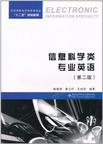信息科学类专业英语
出版时间:2011-2 出版社:西安电子科技大学出版社 作者:韩俊岗,袁立行,王忠民 编著 页数:222
Tag标签:无
内容概要
这本《信息科学类专业英语(第2版)》由韩俊岗、袁立行和王忠民编著,选取了信息科学前沿领域的相关内容,具有内容新、知识面广、难度大、趣味形强等特点。书中主要涉及物联网、云计算、可重构计算、极大规模计算、量子计算、4G无线通信、片上网络、多智能体系统、纳米技术、系统芯片设计、微机电系统、生物信息学、嵌入式系统、可穿戴计算机、人工嗅觉、图形处理器等相关新技术各领域的最新知识,具有一定的广泛性和综合性。在每课末,结合课文内容,均给出了相关的重点、难点句子的解释;同时,为增强学生的阅读兴趣,扩展知识面,提高阅读理解能力,本书采用了大学六级英语考试和研究生入学考试中的阅读理解题的形式,来考查学生对难句、长句和结构复杂句型的理解。
《信息科学类专业英语(第2版)既可用作高等理工科院校信息科学与技术,包括电子信息工程、计算机、自动化、微电子学等专业的专业英语教材,又可作为相关领域技术人员的参考书。
书籍目录
Lesson 1 Towards a Mathematical Science of Computation
(第一课 数学化的计算科学的前景)
Vocabulary(词汇)
Important Sentences(重点句)
Questions and Answers(问答)
Problems(问题)
Lesson 2 Extreme Scale Computing
(第二课 超大规模计算)
Vocabulary(词汇)
Important Sentences(重点句)
Questions and Answers(问答)
Problems(问题)
Lesson 3 Utilisation of the GPU Architecture for HPC
(第三课 GPU用于高性能计算)
Vocabulary(词汇)
Important Sentences(重点句)
Questions and Answers(问答)
Problems(问题)
Lesson 4 Quantum Computing
(第四课 量子计算)
Vocabulary(词汇)
Important Sentences(重点句)
Questions and Answers(问答)
Problems(问题)
Reading Material(阅读材料)
Lesson 5 Introduction to Cloud Computing
(第五课 云计算简介)
Vocabulary(词汇)
Important Sentences(重点句)
Questions and Answers(问答)
Problems(问题)
Reading Material(阅读材料)
Lesson 6 The Internet of Things
(第六课 物联网)
Vocabulary(词汇)
Important Sentences(重点句)
Multiple-choice Questions(多选题)
Problems(问题)
Lesson 7 Configurable Computing
(第七课 可重构计算)
Vocabulary(词汇)
Important Sentences(重点句)
Questions and Answers(问答)
Problems(问题)
Reading Material(阅读材料)
Lesson 8 Top-down SoC Design Methodology
(第八课 自顶向下的SoC设计方法学)
Vocabulary(词汇)
Important Sentences(重点句)
Questions and Answers(问答)
Problems(问题)
Lesson 9 Survey of Research and Practices of Network-on-Chip
(第九课 片上网络的研究与实践综述)
Vocabulary(词汇)
Important Sentences(重点句)
Questions and Answers(问答)
Problems(问题)
Lesson 10 Data Warehouse Overview
(第十课 数据仓库概论)
Vocabulary(词汇)
Important Sentences(重点句)
Questions and Answers(问答)
Problems(问题)
Lesson 11 Agent-Oriented Software Engineering
(第十一课 面向智能体的软件工程)
Vocabulary(词汇)
Important Sentences(重点句)
Questions and Answers(问答)
Problems(问题)
Lesson 12 Why So,ware should not Have Owners?
(第十二课 为什么软件不应当有所有者?)
Vocabulary(词汇)
Important Sentences(重点句)
Questions and Answers(问答)
Problems(问题)
Lesson 13 About 4G
(第十三课 关于4G)
Vocabulary(词汇)
Important Sentences(重点句)
Questions and Answers(问答)
Problems(问题)
Lesson 14 What the Internet might Look like in 2020
(第十四课 2020年的因特网)
Vocabulary(词汇)
Important Sentences(重点句)
Multiple-choice Questions(多选题)
Problems(问题)
Lesson 15 How Do Search Engines Work?
(第十五课 搜索引擎如何工作?)
Vocabulary(词汇)
Important Sentences(重点句)
Multiple-choice Questions(多选题)
Problems(问题)
Lesson 16 Embedded Systems: a Primer
(第十六课 嵌入式系统:初级)
Vocabulary(词汇)
Important Sentences(重点句)
Multiple-choice Questions(多选题)
Problems(问题)
Lesson 17 Wearable Computing FAQ
(第十七课 可穿戴计算机)
Vocabulary(词汇)
Important Sentences(重点句)
Questions and Answers(问答)
Problems(问题)
Reading Material(阅读材料)
Lesson 18 How Close are Artificial Noses to Development and What
are the Potential Uses?
(第十八课 人工嗅觉的发展及其应用)
Vocabulary(词汇)
Important Sentences(重点句)
Questions and Answers(问答)
Problems(问题)
Lesson 19 Smart Rooms
(第十九课 智能房间)
Vocabulary(词汇)
Important Sentences(重点句)
Questions and Answers(问答)
Problems(问题)
Lesson 20 Recent Advances in Computer Vision
(第二十课 计算机视觉的新进展)
Vocabulary(词汇)
Important Sentences(重点句)
Questions and Answers(问答)
Problems(问题)
Lesson 21 Introduction to Artificial Intelligence
(第二十一课 现代人工智能简介)
Vocabulary(词汇)
Important Sentences(重点句)
Multiple-Choice Questions(多选题)
Problems(问题)
Reading Material(阅读材料)
Lesson 22 Moore's Iaw: the Future of Simicroelectronics
(第二十二课 摩尔定律:硅微电子学的未来)
Vocabulary(词汇)
Important Sentences(重点句)
Questions and Answers(问答)
Problems(问题)
Lesson 23 Introduction to Bioinformatics
(第二十三课 生物信息学简介)
Vocabulary(词汇)
Important Sentences(重点句)
Questions and Answers(问答)
Problems(问题)
Lesson 24 An Introduction to MEMS(Micro-electromechanical Systems)
(第二十四课 微机电系统简介)
Vocabulary(词汇)
Important Sentences(重点句)
Questions and Answers(问答)
Problems(问题)
Lesson 25 About Nanotechnology)
(第二十五课 关于纳米技术)
Vocabulary(词汇)
Important Sentences(重点句)
Questions and Answers(问答)
Problems(问题)
章节摘录
In 1936, the notion of a computable function was clarified by Turing, and he showed the existence of universal computers that, with an appropriate prograrri, could compute any thing computed by any other computer, All our stored program computers, when provided with unlimited auxiliary storage, are universal in Turing's sense. In some subconscious sense even the sales departments of computer manufacturers are aware of this, and they do not advertise mag icinstructions that cannot be simulated on competitors machines, but only that their machines are faster, cheaper, have more memory, or are easier to program. The second major result was the existence of classes of unsolvable problems. This keeps all but the most ignorant of us out of certain Quixotic enterprises such as trying to invent a debuggingprocedure that can infallibly tell if a program being examined will get into a loop. Later in this paper we shall discuss the relevance of the results of mathematical logic on creative sets to the problem of whether it is possible for a machine to be as intelligent as a human. In my opinion it is very important to build a firmer bridge between logic and recursive function theory on the one side, and the practice of computation on the other. ……
图书封面
图书标签Tags
无
评论、评分、阅读与下载
用户评论 (总计7条)
- 书还不错,有活动优惠便宜
- 这是帮同学买的一本书,是正版的,不错
- 速度很快,就用了一天,令我很惊讶
- 书包装的很好 送货也很快 很满意
- 指定教科书。。。。。最后考试倒是和本书相关性不大 毕竟 英语嘛
- 书里的单词好多事科技类的单词
- 我们老师写的,上课用的,还可以。
